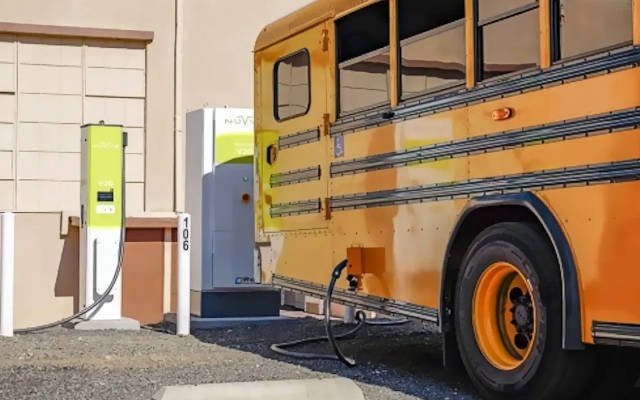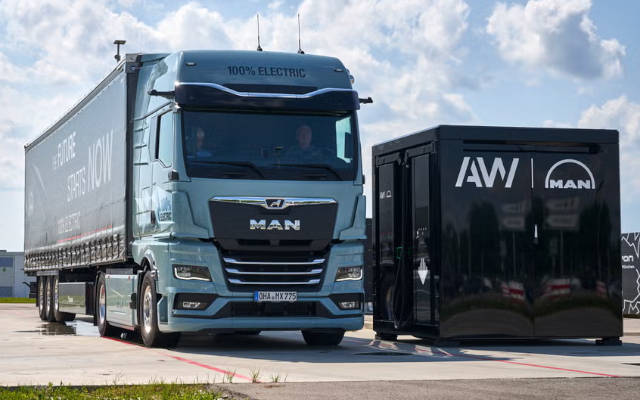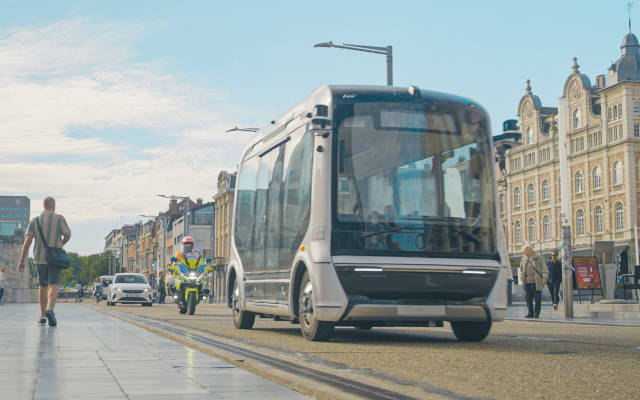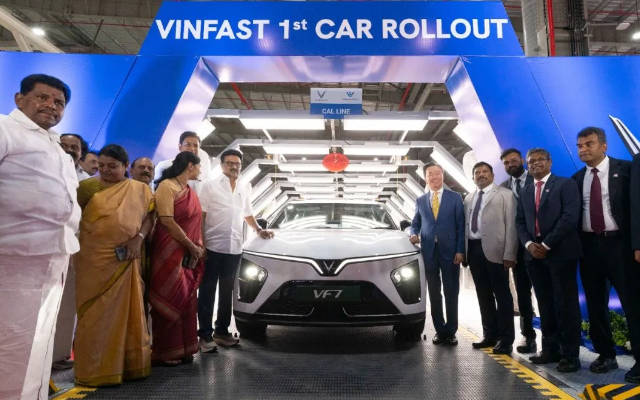 EDITOR'S PICK
EDITOR'S PICK
ComEd Begins Testing Phase of First of Its Kind Vehicle-to-Grid Charging Pilot with Local School Districts
14 Sep 2025 | Synopsis
 ComEd launched testing for its first vehicle-to-grid (V2G) charging pilot with three Illinois school districts. The initiative uses bidirectional chargers on electric school buses to explore energy optimization, grid support, and cost savings during peak demand. Part of ComEd's Beneficial Electrification Plan, the pilot aims to scale V2G tech and includes partners like Nuvve and Resource Innovations.
ComEd launched testing for its first vehicle-to-grid (V2G) charging pilot with three Illinois school districts. The initiative uses bidirectional chargers on electric school buses to explore energy optimization, grid support, and cost savings during peak demand. Part of ComEd's Beneficial Electrification Plan, the pilot aims to scale V2G tech and includes partners like Nuvve and Resource Innovations.The Illusion of Clean: How Big Oil Perfected the Art of Greenwashing
13 Sep 2025 | Synopsis
 Big Oil's decades-long greenwashing campaign used PR to mask environmental harm. Chevron's "People Do" ads, Exxon's climate denial lobbying, and BP's carbon footprint push shifted blame to consumers. Investors like BlackRock and execs like Rex Tillerson profited, while conservative politicians traded support for donations. Lawsuits from cities and youth groups now challenge fossil fuel deception, aiming to hold companies accountable in court.
Big Oil's decades-long greenwashing campaign used PR to mask environmental harm. Chevron's "People Do" ads, Exxon's climate denial lobbying, and BP's carbon footprint push shifted blame to consumers. Investors like BlackRock and execs like Rex Tillerson profited, while conservative politicians traded support for donations. Lawsuits from cities and youth groups now challenge fossil fuel deception, aiming to hold companies accountable in court.This Giant Black Box is the EV Charger of the Future
13 Sep 2025 | Synopsis
 A massive black box spotted in California is the Smart Charging Cube, a mobile EV fast charger built by AW Automotive and MAN Truck & Bus. Designed for electric big rigs, it delivers up to 400 kW from its onboard battery and up to 1,000 kW when connected to a Megawatt Charging System. It’s built for job sites and fleet use, offering high-speed charging without permanent grid infrastructure.
A massive black box spotted in California is the Smart Charging Cube, a mobile EV fast charger built by AW Automotive and MAN Truck & Bus. Designed for electric big rigs, it delivers up to 400 kW from its onboard battery and up to 1,000 kW when connected to a Megawatt Charging System. It’s built for job sites and fleet use, offering high-speed charging without permanent grid infrastructure.WeRide Enters Belgium as Autonomous Robobus Rolls Into Leuven
11 Sep 2025 | Synopsis
 WeRide launched its autonomous Robobus in Leuven, Belgium, marking its 11th global market. In partnership with De Lijn and Espaces-Mobilités, the pilot will run through January 2026, aiming to improve first- and last-mile transit. Mapping begins now, with public testing mid-September. The project reflects Belgium’s push for smart mobility and AV integration.
WeRide launched its autonomous Robobus in Leuven, Belgium, marking its 11th global market. In partnership with De Lijn and Espaces-Mobilités, the pilot will run through January 2026, aiming to improve first- and last-mile transit. Mapping begins now, with public testing mid-September. The project reflects Belgium’s push for smart mobility and AV integration.What's Keeping The Indian Middle Class From Driving An Electric Car?
11 Sep 2025 | Synopsis
 India’s middle class is hesitant to adopt EVs due to high import prices, limited public charging, and range anxiety. Tesla’s Model Y costs ₹6M ($68K), far above mainstream affordability. Local production is key—Vietnam’s VinFast and India’s Tata Motors offer EVs closer to ₹1–2.3M. With EVs at just 5.3% market share, scaling infrastructure and lowering costs are critical for broader adoption.
India’s middle class is hesitant to adopt EVs due to high import prices, limited public charging, and range anxiety. Tesla’s Model Y costs ₹6M ($68K), far above mainstream affordability. Local production is key—Vietnam’s VinFast and India’s Tata Motors offer EVs closer to ₹1–2.3M. With EVs at just 5.3% market share, scaling infrastructure and lowering costs are critical for broader adoption.
 EVWorld Exclusive
EVWorld Exclusive
Unlocking Heat's Hidden Potential: How a Nanoscale Discovery Could Transform Everyday Tech
24 Oct 2025 |  A recent nanoscale physics breakthrough reveals heat can transfer across tiny gaps far more efficiently than expected - up to 100 times greater than classical predictions. This could revolutionize cooling and energy systems in electronics, EVs, and smart appliances. While engineering challenges remain, early applications may emerge within 3-5 years, with broader consumer adoption possible in the next decade. The future of heat management may be silent, solid-state, and radically efficient.
A recent nanoscale physics breakthrough reveals heat can transfer across tiny gaps far more efficiently than expected - up to 100 times greater than classical predictions. This could revolutionize cooling and energy systems in electronics, EVs, and smart appliances. While engineering challenges remain, early applications may emerge within 3-5 years, with broader consumer adoption possible in the next decade. The future of heat management may be silent, solid-state, and radically efficient.
Turning the Energy Crunch into a Smart Grid Revolution
24 Oct 2025 |  America's energy crunch is not about supply - it's about coordination. Virtual power plants and vehicle-to-grid systems offer a scalable, software-driven solution to rising demand from AI, EVs, and climate volatility. By turning homes, vehicles, and businesses into active grid assets, and aligning policy with technology, the U.S. can build a smarter, more resilient energy future without building more power plants. The tools exist - now it's time to connect them.
America's energy crunch is not about supply - it's about coordination. Virtual power plants and vehicle-to-grid systems offer a scalable, software-driven solution to rising demand from AI, EVs, and climate volatility. By turning homes, vehicles, and businesses into active grid assets, and aligning policy with technology, the U.S. can build a smarter, more resilient energy future without building more power plants. The tools exist - now it's time to connect them.
Auto Retail in 2025: Bridging the Trust Gap Between Dealers and Buyers
24 Oct 2025 |  The 2025 Urban Science and Harris Poll report reveals a growing disconnect between dealers and buyers. While dealers embrace EVs, AI, and digital tools, many buyers remain cautious - especially about full electrification and online-only retail. Brand loyalty is weakening, and policy clarity is key to adoption. The future of auto retail depends on bridging trust, flexibility, and infrastructure gaps.
The 2025 Urban Science and Harris Poll report reveals a growing disconnect between dealers and buyers. While dealers embrace EVs, AI, and digital tools, many buyers remain cautious - especially about full electrification and online-only retail. Brand loyalty is weakening, and policy clarity is key to adoption. The future of auto retail depends on bridging trust, flexibility, and infrastructure gaps.
Electric Icons in the Making: Audi Concept C vs. Chevrolet Corvette EV
23 Oct 2025 |  Audi's Concept C previews a refined electric GT built on the mature PPE platform, likely arriving by 2026. Chevrolet's Corvette EV promises supercar performance but faces packaging and thermal challenges. Audi is closer to production; Corvette remains in early development. Both reflect divergent strategies in electrifying legacy sports cars, with Audi emphasizing platform maturity and Chevrolet pursuing brand continuity through engineering innovation.
Audi's Concept C previews a refined electric GT built on the mature PPE platform, likely arriving by 2026. Chevrolet's Corvette EV promises supercar performance but faces packaging and thermal challenges. Audi is closer to production; Corvette remains in early development. Both reflect divergent strategies in electrifying legacy sports cars, with Audi emphasizing platform maturity and Chevrolet pursuing brand continuity through engineering innovation.
Electrification Is Not an Oversimplification
23 Oct 2025 |  Despite critiques that the quest for global electrification is "simplistic", the transition is strategic and necessary. Grid upgrades, battery innovation, and tailored policies make electrification viable. Sodium-ion batteries and recycling reduce material risk. Compared to fossil fuels, electrification offers cleaner, safer, and more resilient systems. Complexity demands better design - not delay.
Despite critiques that the quest for global electrification is "simplistic", the transition is strategic and necessary. Grid upgrades, battery innovation, and tailored policies make electrification viable. Sodium-ion batteries and recycling reduce material risk. Compared to fossil fuels, electrification offers cleaner, safer, and more resilient systems. Complexity demands better design - not delay.
 25 Oct 2025 13:06:28 UTC |
RECENT PODCASTS
What Battery Chemistry Wins - Ontario Nuclear Investment - Battery Storage Boom
SEARCH RSSTREAM
 49 New Postings In Past 24 Hours
49 New Postings In Past 24 Hours
Category:review
Region:Europe
Date:25 Oct 2025
Category:review
Region:NoAmerica
Date:25 Oct 2025
Category:mobility
Region:AsiaPacific
Date:25 Oct 2025
Category:finance
Region:Europe
Date:25 Oct 2025
Category:mobility
Region:Europe
Date:25 Oct 2025
Category:mobility
Region:NoAmerica
Date:25 Oct 2025
Category:mobility
Region:Europe
Date:25 Oct 2025
Category:energy
Region:Europe
Date:25 Oct 2025
Category:autonomy
Region:NoAmerica
Date:25 Oct 2025
Category:mobility
Region:NoAmerica
Date:24 Oct 2025
Category:review
Region:NoAmerica
Date:24 Oct 2025
Category:mobility
Region:NoAmerica
Date:24 Oct 2025
Category:energy
Region:NoAmerica
Date:24 Oct 2025
Category:mobility
Region:AsiaPacific
Date:24 Oct 2025
Category:mobility
Region:NoAmerica
Date:24 Oct 2025
Category:energy
Region:AsiaPacific
Date:24 Oct 2025
Category:policy
Region:NoAmerica
Date:24 Oct 2025
Category:energy
Region:NoAmerica
Date:24 Oct 2025
Category:energy
Region:Global
Date:24 Oct 2025
Category:mobility
Region:NoAmerica
Date:24 Oct 2025